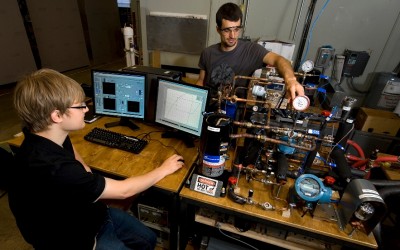Jul
21
New Space Heating Technology from an Old Idea
July 21, 2010 | 4 Comments
Starting with the Ericsson Cycle idea, Purdue University researchers have developed a new type of heat pump that could allow residents in cold climates to cut their heating bills in half.
Eckhard Groll, a professor of mechanical engineering who is working on the project with James Braun professor of mechanical engineering and W. Travis Horton, an assistant professor of civil engineering said, “With this technology we can maintain the efficiency of the heat pump even when it gets pretty cold outside.”
The new technology works by modifying the conventional vapor-compression cycle behind standard air conditioning and refrigeration. The standard vapor-compression cycle has four stages: refrigerant is compressed as a vapor, condenses into a liquid, expands to a mixture of liquid and vapor, and then evaporates.
The project will investigate two cooling approaches during the compression process. In one approach, relatively large amounts of oil are injected into the compressor to absorb heat generated throughout the compression stage. In the second approach, a mixture of liquid and vapor refrigerant from the expansion stage is injected at various points during compression to provide cooling. The added steps improve the compression process while also reducing energy losses due to friction in the expansion stage.
Braun explains, “Cooling the compressor keeps the refrigerant dense, and that’s important because it takes less energy to compress something that’s more dense.”
The researchers are developing a system for precisely controlling the flow of refrigerant from the evaporation stage into the compression stage using a series of small valves. A critical component of the new heat pump is a “scroll compressor,” which uses a rotating, scroll-shaped mechanism to compress refrigerant. Domestic heat pumps normally use reciprocating compressors, in which a piston compresses refrigerant.
Groll continues with, “You can’t inject a liquid into a reciprocating compressor, whereas you can with a scroll compressor, which is uniquely suited for this modification. Also, an important part of our project will be to determine the efficiency of a machine that pumps liquid while also compressing gas, so there will be a lot of computational modeling involved.”
The work grew out of research into the Ericsson Cycle, an exotic refrigeration technology in which liquid is added to coolant as it is being compressed. The Ericsson Cycle, however, does not use the vapor-compression cycle because the gas never turns to liquid.
The Purdue researchers expect to complete a prototype by the end of the three-year, $1.3 million project. The research, which also involves three doctoral students, is a partnership with Emerson Climate Technologies Inc. and Carrier Corp. Emerson will work with researchers to create the prototype heat pump, and Carrier will integrate the new heat pump into a complete system.
Two research papers about the work will be presented during the 13th International Refrigeration and Air Conditioning Conference, the 20th International Compressor Engineering Conference and the first International High Performance Buildings Conference from July 12-15 at Purdue. Sorry, but the information is behind a very high priced registration wall.
Braun said, “This could be a relatively simple modification to existing heat pumps, refrigeration and air conditioning systems.”
Revisiting the quite old Ericsson Cycle is a stroke of insight that deserves congratulations. The premise is sound, and the mechanical engineering should be attainable in mass production for consumers.
Taking another bite out of the heat pump cost – which is already quite an advantage until its pretty cold would be more helpful. For most of the U.S. heat pumps offer great savings and when heating use base load that is under utilized. One still wonders – will the advantage be applied at high air conditioning demand as well?
Lets hope the papers become available, soon. Good work at Purdue that looks to go commercial, something the world needs more of.
Comments
4 Comments so far



Will this benefit Ground Source Heat Pump systems that operate in a more favorable temperature range?
Keep posting stuff like this i really like it
Wow this is a great resource.. I’m enjoying it.. good article
Keep on going with those great posts. I hope to come back soon for more writing.